
the Pittsylvania Circuit Court had to appoint a new Banister District supervisor in 2022, after the Board of Supervisors failed to select a replacement
Source: Pittsylvania County, Redistricting

the Pittsylvania Circuit Court had to appoint a new Banister District supervisor in 2022, after the Board of Supervisors failed to select a replacement
Source: Pittsylvania County, Redistricting
If a local elected official leaves office, the remaining members of the city council, school board, county board of supervisors, or Soil and Water Conservation Districts typically appoint a replacement to serve until the next general election. In 2024, the General Assembly created new requirements to increase transparency in the process.
The legislation was prompted in part after the five-member school board in Isle of Wight County made three interim appointments within two months in 2021. No discussions were held in public, and replacement members that ended up composing a majority of the "elected" school board were chosen without getting public input.
The 2024 law now requires a public meeting at least seven days before making an appointment to a local governing body or an elected school board. The names of potential appointees, and any resumes or other qualifying materials required by the appointing board, must be made public.
If the remaining members on a board can not agree on a replacement, then the Circuit Court judge will decide on the date of an election for a replacement.
If there already is an election scheduled for a seat with an appointed member, then the appointee must win the election if they wish to serve a full term. If an election for the position filled by the appointed person is not already scheduled for the next general election, then a special election for that seat is held at the same time as the general election.
If the person who was appointed runs in the special election and wins the seat, then they will serve out the remainder of the term. Otherwise, someone else will fill the seat. Either way, after the special election an elected - rather than appointed - person will serve for the remainder of the term.
In January 2023, the Town Council in Purcellville tried to bypass the requirement for a special election. A majority on the Town Council appointed a person to serve for two years through 2024, completing the remainder of a four-year term without having the office on the ballot in November 2023. The Town Attorney made clear that state law limited the ability to appoint a replacement, but the Town Council members who wanted to gain a political ally for two years argued that the town charter provided a different authority.
To clarify the amount of time that the replacement appointee could serve, two council members asked the Loudoun County Circuit Court to force the Town Council to request a special election. In the end, the Purcellville Town Council agreed to request a special election.
In 2022, the supervisor in the Banister District of Pittsylvania County resigned. That removed one of the 4-member voting bloc which had fired the county administrator and dominated decisions on the board. The remaining six members of the Board of Supervisors then deadlocked in 3-3 votes regarding the process to appoint a replacement. At one point, the board was unable even to approve an agenda for a meeting. After failing to agree on a replacement within the required 45-day window, the board notified the Circuit Court that a judge would have to appoint someone to represent the 9,000 residents in the Banister District.
In just one local jurisdiction, the General Assembly has established that an election is required. The Code of Virginia specifically prohibits the Board of County Supervisors in Prince William County from replacing a member by appointment. That limit was imposed after the Board of County Supervisors appointed a new supervisor in 1998 who claimed to be a Republican, but was closely aligned with the Democrat who chaired the Board. The General Assembly, which in 1999 was controlled by Republicans for the first time, punished the county in response.
When the supervisor in Prince William County's Neabsco District died in early 2019, and when the Gainesville Magisterial District supervisor resigned in 2022, special elections were required. Until the votes after a new election were certified, no one could serve as an acting or appointed supervisor for those districts.
Virginia has a general election every year in November. That means that the term of an appointed, rather than an elected, member is limited to less than a year, a special election would not be necessary. Local jurisdictions also have the option of leaving a seat vacant until the next general election. In June 2021 the Purcellville Town Council interviewed five candidates in anticipation of appointing one to fill an open seat, but then decided to appoint no one before the November election.
Two members of the Manassas City Council ran for mayor in 2020, guaranteeing that a replacement would need to be appointed after the election. The Republican candidate lost, and remained in her council position to complete the rest of her term. The Democratic candidate won the election and moved over to the mayor's office. In Manassas, the mayor got to vote only when needed to break a tie. That meant the candidate who lost the race for mayor got to vote on the appointment of a replacement for the winner, while the winner had no vote in the decision.
Local officials in Virginia also include Treasurer, Commissioner of the Revenue, Sheriff, Commonwealth's Attorney, and Clerk of the Circuit Court. These five positions are known as "constitutional officers." State law requires a special election to fill a vacancy in a constitutional office, unless it becomes vacant less than 12 months before the term was supposed to end:1
If a Circuit Court judge determines that a locally-elected official is incapable of performing the job, the judge may remove the official and appoint a replacement. In 2022, a Patrick County Circuit Court judge removed the county's Circuit Court Clerk from that office. She had been arrested in June for Driving While Intoxicated (DWI). In November she was arrested for possession of cocaine and intoxication in public, and then for breaking and entering.
Before she was arraigned in the county's General District Court, the Circuit Court determined she was "by reason of mental and/or physical disability... unable to perform her duties" and appointed a replacement.
If a local officeholder in Virginia is convicted of a felony, they are automatically removed from office. That will trigger a special election.
When a special election is required, the city council, school board, or county board of supervisors must petition the local Circuit Court to set a date for the election. A judge will issue a writ of election that sets the date.
In four Virginia localities, Hampton, Norfolk, Portsmouth, and Lynchburg, a recall mechanism is specified for local offices. In Hampton, Norfolk, and Lynchburg, there is a two stage process. In Lynchburg, a petition for recall must be signed by 10% of the registered voters. If that is done, then a second petition at the registrar's office must be signed by 15% of the registered voters in Lynchburg within 30 days.
In Norfolk, the first petition must be signed by just 300 voters, and the second petition requires signatures from 10% of the registered voters. In Hampton, the first petition must be signed by 10% of the number of voters in the last regular council election and the threshold for the second petition is 25%.
The recall process in Portsmouth involves just one step. A petition must be signed by 30% of the number of voters who cast ballots in the most recent gubernatorial election.
In all other counties. cities and towns, voters can trigger a recall of local officials through a petition to the Circuit Court judge. The petition will be considered if it has enough valid signatures, 10% of the total votes in the last election for that particular office. If the Circuit Court judge concurs with the petition, the judge will issue a writs of election.
Judges can also reject the petition, if they decide the justification for the recall is not sufficient. Petitioners have no right of appeal; the judge's decision is final. No judge in Virginia has ever removed a person from office after receiving a recall petition.
The legal standard is:2
In 2021, a Fairfax Circuit Court judge rejected a petition to recall a school board member. The recall advocates had gathered the required number of signatures on a petition to remove the member from the Dranesville District, citing her support of keeping schools closed during the COVID-19 pandemic. The lawyer representing the school board member argued that there was no legal requirement to offer in-person instruction during a pandemic. The judge ruled in her favor and blocked the recall effort from proceeding to a vote, saying that the petition was not based on facts establishing probable cause for removal.
In 2022, a Suffolk Circuit Court dismissed a recall petition signed by 800 people who claimed she had violated the Freedom of Information Act. The judge found no specific, identifiable acts that justified removal. Even the lawyer appointed to represent the petitioners was clear in her opinion that the petition was not valid, saying:3
Some resignations and then appointments of replacements are planned successions. Constitutional officers who resign in the last year of their term can giving their deputies an opportunity to gain name recognition and other advantages before an election.
Local officials and state judges can manipulate the date to benefit preferred candidates, or to time the replacement so it occurs before/after a key vote. On February 6, 2019, the supervisor for the Neabsco Magisterial District in Prince William County died while serving the last year of his term. In that particular county, the remaining supervisors do not have the option of appointing a replacement even when there is less than a year left before the next general election.
There was a Democratic primary scheduled for June 11, and state law prohibited the special election from being held within 60 days of the state-run primary, so the supervisors petitioned for an election on April 2. That triggered a requirement for elections being held within 60 days that gave Democratic candidates only five days to file, and the Neabsco District was so heavily Democratic that the Republicans considered not even nominating a candidate.
Local Democratic Party officials decided in a Saturday night meeting to hold a one-hour firehouse primary from 3:30-4:30pm on the following Tuesday afternoon. However, that plan violated the state party's requirements for seven days' notice of an upcoming election. To solve the dilemma, the Prince William County Board of County Supervisors then requested that the judge vacate the original writ of election. He agreed to postpone signing the new writ, so the deadlines for notice could be met while still holding the special election at least 60 days before the primary.
The Prince William County Board of County Supervisors, which accommodated the Democratic Party's deadlines for public notice, was 6-1 Republican at the time.4

the Neabsco magisterial district in Prince William County (as of 2019)
Source: Prince William Mapper, Local Election Districts
In 2018, the Richmond Times-Dispatch reported that all but one replacement for constitutional officers in Chesterfield County had won the next election since 1991. The pattern resembled a system of patronage where incumbents timed their resignations in order to hand-pick their replacements.5
Some resignations are clearly unplanned, and some are forced. A member of the Bristol City Council resigned in 2018 as other members prepared to expel him. He had requested the vice-mayor to purchase a parcel, in exchange for which he would resign and leave town. The call had been recorded, so the evidence of inappropriate conduct was clear.
In 2019, the mayor of the town of Front Royal resigned after being indicted for prostitution solicitation. The Town Council appointed a former member of the Board of Supervisors to serve as interim mayor until the general election in November, and the interim mayor did not choose to run in that race. The mayor who had resigned did chose to run for re-election, but was defeated by another member of the Town Council. Because he was filling a vacant position, the new mayor took office as soon as the votes were certified to serve the rest of the term (which ended in 2020).
The election of a member on Town Council created a new vacancy on that governing body. Town Council could appoint a new member, just as they had appointed a replacement mayor. If the council could not get a majority vote for any replacement, then it could petition the Circuit Court and have a judge make an appointment.6
The charter for the City of Virginia Beach requires that elected local officials must live in the district they represent.
The City of Virginia Beach has an 11-member City Council, plus a mayor. Three members, including the mayor, used to be elected in at-large districts elected by all the voters in the city. Seven members represented specific geographic districts, and were elected by the residents who vote in just those seven areas.
In a 2018 City Council race decided by just by 163 votes, David Nygaard defeated the incumbent who had represented the Beach District for the last 12 years. Nygaard had rented a duplex within the district and claimed it as his residence, but others thought he still was living with his family in the Lynnhaven District. One opponent challenged his status as a resident before the election, after driving by the duplex multiple times and seeing little evidence of occupancy. There was just an inflatable mattress in the living room, and no car was seen parked at the rental unit.
The Commonwealth's Attorney investigated the claim, but reported there was insufficient evidence and declined to take any action. After the election, the defeated incumbent filed suit to challenge Nygaard's eligibility to serve on City Council. A three-judge panel from the Circuit Court determined the duplex rental did not qualify as an official residence and removed David Nygaard from City Council. The court decision noted an e-mail that Nygaard had sent to the rental company before the election stated:7
The removal created a vacancy on the Virginia Beach City Council. It appointed a member to serve until a special election for the Beach District seat could be held along with other elections in November, 2019.
Nygaard initially requested to be appointed and planned to run again; he had moved to another apartment in the Beach District. However, he finally changed his mind and decided not to run again. The incumbent he had defeated, John Uhrin, ended up as one of the five finalists considered by City Council for the appointment but then withdrew.
The City Council chose the former executive director of the Virginia Bar Association, a man who planned to serve only for six months and not to run for election in November. However, he changed his mind and was a candidate in the general election, which he won.8
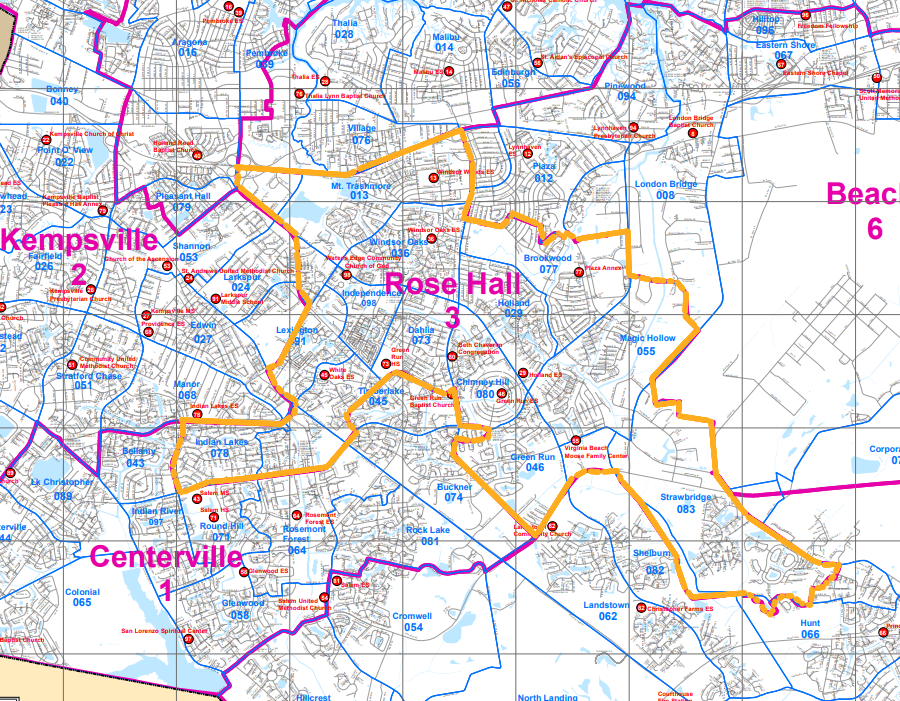
the Rose Hall district in Virginia Beach
Source: City of Virginia Beach, Local Election Districts
The residency requirement in the charter applies to incumbents as well as to candidates for office, at least in Virginia Beach. If an elected official moves their official residence out of a Virginia Beach district, the official must vacate the office and allow for a replacement to be chosen.
On April 11, 2019, a Virginia Beach Circuit Court judge declared the School Board seat for the Rose Hall District to be vacant. The member elected to the School Board for that district had moved out of it for financial reasons; he was unable to afford his old residence and moved to a less-expensive apartment. The judge rejected arguments from lawyers that state law required local residency only for election, and not for continued service throughout a term. He also rejected arguments that the case should be dropped because the school board member had moved back into the district before the case was filed.
The Commonwealth's Attorney ultimately determined that the School Board member's decisions on notifying/not notifying the school system's administration about his moves were "highly suspicious," but not criminal. There was no legal requirement that an elected official give notice of an address change.
Soon afterwards in 2019, the councilwoman for the Rose Hall District resigned her seat because she too was moving out of that district. She had planned to serve on Virginia Beach's City Council until the end of her term that year, then move into a new home in the Princess Anne District. She put her house on the market and it sold in just one day, triggering a faster-than-planned move and the need to resign her council seat before her term ended.
The Virginia Beach City Council and School Board filled the vacancies. They invited residents to apply, considered those who did, and then appointed interim members. They could serve until the next general election.
The School Board appointee resigned within 24 hours, after the public identified earlier anti-Muslim social media posts from him. That resignation forced the School Board to appoint a second person.
Discussions of the first School Board appointment occurred in closed sessions. That was legal since the appointment was a personnel matter, and discussions for the last one seven years earlier had also been in closed session. The second time in 2019, the School Board posted the applications of candidates online, increasing transparency and involving the general public in the appointment process.
The appointee to the City Council for the Rose Hall District ran in the general election that fall and won. His predecessor, the woman who had resigned her City Council seat when she moved out of Rose Hall to the Princess Anne District, was defeated in her race for the for the 21st District seat in the House of Delegates.
The 2021 General Assembly passed a law in 2021 requiring the city to establish 10 single-member districts. That law reduced the potential for more elected officials in Virginia Beach to be forced out of office when they moved.9

the Virginia Beach School Board had to appoint two people to fill the seat for the Rose Hall district in 2019
Source: City of Virginia Beach, School Board
In Richmond, a member of City Council moved from the 5th District to the 1st District in 2018. He rented his old house in the 5th District, from which he had been elected in 2012 and again in 2016. Two people filed suit to force him from office, which paid $25,000/year. The Richmond City Attorney determined that the council had no authority to remove a member based on his residency, but the Virginia Attorney General took action. He offered not to bring charges that could force the City Council member from office if he resigned by the end of 2019, rather than served his full term through 2020.
The two lawsuits were filed by former City Council members. One asked a judge to declare the seat vacant because the person who had been elected no longer met the residency requirement. The other lawsuit cited the same problem, and suggested that the 1st District was being represented by two members on City Council and the 5th District had none.10
The City Council member finally announced in April, 2019 that he would resign on November 30, a year before his term ended. He took the deal offered by the Richmond Commonwealth's Attorney, who had followed the Virginia Attorney General and offered not to prosecute in exchange for an early resignation. The two former City Council members were not satisfied, and one commented:11
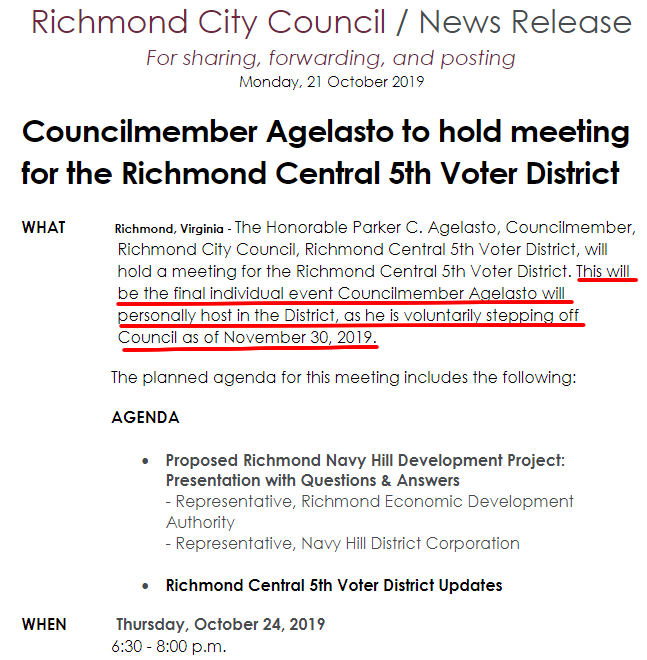
the City Council member for the 5th District in Richmond stayed active after agreeing to resign because he had moved out of the district
Source: City of Richmond, Richmond City Council
The member who chose to resign his seat on City Council spent at least $14,000 fighting the lawsuits trying to force him from office immediately. He requested that the Richmond City Council pay those legal fees, but the City Attorney issued an opinion saying that the decision on where to live was a personal, private decision and did not qualify as an official duty for which public funds could be used.
The local judges declined to declare the City Council seat vacant, after finding procedural objections to processing the lawsuits filed by the two former City Council members. A new member of City Council was elected in November, 2019 and took office at the end of that month. The General Assembly modified the city's charter in 2020 to authorize removal from the City Council if an elected member violated a new provision:12

the General Assembly modified Richmond's charter to specify residency requirements for members of City Council
Source: Virginia Legislative Information System, 2020 Uncodified Acts, Chapter 141 (March 4, 2020)
In some charters granted by the General Assembly, an elected member of a town council can be expelled by a 2/3 vote of the other members. No cause needs to be cited for the expulsion, as demonstrated in July 2019 when the Town of Amherst kicked one of its five members off the council. The mayor and three town council members had been elected the previous November, and the member who was expelled had received the second highest number of votes for a town council seat.
The vote to expel Councilwoman Janice Wheaton came as a surprise after the council met in a closed session to discuss "personnel disciplining of specific public officers." Some in the community questioned if such a closed session could be held if the person involved was an elected official, rather than an employee of the town. A member of the separate Board of Supervisors for Amherst County commented:13

the Town of Amherst had advertised that the top vote-getters in 2018 would serve a four-year term
Source: Town of Amherst, Town Council
The Amherst Town Council then appointed an interim member to serve until a new person could be elected in November to fill out the term. The person appointed to serve on an interim basis did not file the paperwork required to get on the ballot in the November election.
The person who was kicked off the council ended up as the only candidate on the ballot. At the time, none of the members of town council elaborated on why she had been expelled or what was the threshold of behavior to justify such an action, but no other resident chose to run against her. Later, e-mails were released showing causes of the friction on town council. They indicated she had persistently demanded additional details be recorded in the council minutes, which the others persistently rejected. The council also clarified procedures so council members could not direct town staff to take any actions, requiring all requests to be made instead to the town manager.
Throughout her second campaign, she made clear she would seek a revision in the town charter to limit the authority of the council to expel an elected official. If elected a second time, there was the potential for the other four members to remove her again. She suggested the appropriate response to that action would be a recall campaign to remove the other town council members. She was successful in getting re-elected in the 2019 general election, receiving 60% of the votes with the others going to write-in votes.
Four months after she had been expelled, newly re-elected Janice Wheaton rejoined the council. The mayor greeted her with "welcome back," she nodded thanks, and the meeting proceeded to the first order of business.
In 2020, she failed in her effort to get the Town Council to recommend that the General Assembly revise the charter to eliminate the option of expelling a member. A petition to support her position had been signed by only 1% of the residents. None of the other council members supported her proposal, and they were frustrated that she often voted "no," even against a sewer improvement project required by the state. One member of the council said:14
The General Assembly and the US Congress also have provisions to expel members by a two-thirds vote. The Virginia Attorney General provided an advisory opinion in 2014 that identified the towns of Boyce, Chase City, Chatham, Haymarket, and Irvington also had a similar provision in their charters.
The City of Suffolk School Board has no capability to expel a member. In 2020, it chose in a 5-2 vote to censure one member who, according to the resolution, released information about discussions in closed meetings and violated commitments to confidentiality. She later filed a suit against the other School Board members, claiming they violated the state's Freedom of Information Act and illegally discussed prohibited topics during closed meetings.
The one who was censured had declined, after her election, to participate in training regarding the state's Freedom of Information Act (FOIA), which was offered by the Virginia School Boards Association. The majority on the School Board found her posts on Facebook to be inaccurate, with false accusations regarding the superintendent, and intentionally divisive.
Censure was the strongest action available to the School Board, and one member was blunt in complaining to the censured member:15
However, the censured School Board member won her lawsuit against the School Board. The Suffolk Circuit Court judge ruled that the School Board had violated the Freedom of Information Act nearly 25 times, and awarded her all the requested fees for her attorney and other costs. Her attorney declared that she:16
The Onley Town Council in Accomack County censured its mayor in 2020. The mayor had won a close 2018 election, with 110 votes to his opponent's 109 votes, but was later accused of creating a hostile work environment.
After the Town Council passed a vote of censure in May 2020, the mayor then filed for an injunction to void that action. He claimed the council had planned its censure at a closed meeting which violated the state's Freedom of Information Act.
The local District Court judge recused himself, and the case was assigned to the Amherst District Court judge. The recent expulsion of a member of the Amherst Town Council must have provided that judge a more-than-average understanding of the issues. He ruled that there were no Freedom of Information Act violations when the council held a special executive session to discuss the mayor's behavior.
In 2025, a Bristol City Council member chose to stay in office after admitting he had lied about city employees, including making false statements to damage the reputation of the City Manager, and violated the council's code of ethics. City Council censured him in a unanimous vote, from which the censured member abstained.17

the Onley Town Council censured the mayor in 2020
Source: ESRI, ArcGIS Online
Some charters issued by the General Assembly for local governments authorize recall elections for expelling city officials. In the City of Portsmouth, Mayor James Holley III holds the unique distinction of being recalled twice by the voters. In 1987, Mayor Holley was accused of sending hate mail letters to local community leaders regarding efforts to keep I. C. Norcom High School open, as well as charging the city for excessive travel costs. He was the first Virginia mayor ever to be recalled.
In 1996, he was elected mayor again. After being accused of using his city assistants to perform personal chores, petitioners collected signatures from registered voters equal to 30 percent of the votes cast in the last gubernatorial election. Mayor Holley lost that second recall election in 2010, and City Council appointed a replacement to serve until the next general election. Holley is thought to be the only person in the United States to be recalled twice.18
The Code of Virginia has provisions for removal of elected local officials in all jurisdictions, and it applies when charters do not provide another mechanism. The law automatically removes elected officials who have been convicted of a felony or had their names added to the registry for sex offenders and crimes against minors. Removal takes effect once the last appeal has been concluded.
If the elected official later receives a pardon by the governor or president, they are not restored to their former office. However, they may be re-elected after a pardon.
Removal is also automatic if the official has been determined in a judicial proceeding to be mentally incompetent.
Virginia does not allow for voters to recall officials before their term is completed via an early election except in jurisdictions with special charter provisions. The state does have a unique "recall trial" process. Circuit Court judges have the authority to remove local elected officials, if they determine the person has violated standards of conduct. A petition must be signed by 10% of the total number of votes cast at the last election for the office involved, and a specific cause must be cited in a petition to the judge.
Once enough signatures on the petition has been verified, the local Commonwealth's Attorney will argue a case before the judge that the person should be recalled. Causes that could justify removal include neglect of duty, misuse of office, or incompetence that materially affects the conduct of the office. Misdemeanor convictions involving drugs (including marijuana) or a hate crime are grounds for a judge to remove an official. Judges can suspend officials before the jury trial required to remove an officer, and the suspension may continue until the last appeal is exhausted.19
In 2019, Mayor Richard Orndorff Jr. of Strasburg drove a John Deere Gator recreational vehicle into the Strasburg Town Library during the town's Mayfest celebration and was seriously injured. After several weeks in the hospital, he was charged with driving under the influence of alcohol. His blood alcohol limit at the time of the crash was 0.17. Driving while under the influence was not a new event for the mayor; in 2015, he had pled guilty to drunk driving.
While the mayor was unable to attend meetings, the Strasburg Town Council considered a proposed proffer amendment from a developer. It died on a 4-4 vote, since the mayor was not available to break the tie.
The Strasburg Town Council later censured the mayor, but he declined to resign. To force action, a person whose child was almost hit by the mayor driving the Gator initiated a recall effort. One basis for recall cited in the petition was that the mayor had obtained the alcohol sales license for the event for the Strasburg Chamber of Commerce, but it was no longer a qualified non-profit as he had claimed on the license application.
Strasburg was a small town, with just 794 votes for mayor in 2016. There were 112 residents who signed the recall petition, exceeding the 80 signatures required to meet the 10% threshold. One said:20
Later, a judge blocked action on the petition because of procedural issues, and required that the Town of Strasburg pay for the mayor's attorney fees. However, after an investigation by the Virginia State Police, the mayor was indicted by a Shenandoah County grand jury for unauthorized use of food stamps and/or electronic benefit transfer cards and obtaining town money by false pretenses.
The mayor still chose to run for re-election, but received only 10% of the votes in the 2020 election. Four of the town council's eight seats were also chosen in that election. Since none of the four incumbents had chosen to run, half the town council and the mayor were replaced through elections in 2020. In a 2022 plea deal, the former mayor pled guilty to charges of drunk driving and misusing food stamps, but avoided having to serve time in jail.21

the mayor in the Town of Strasburg was censured in 2019, but completed his term until voted out of office in 2020
Source: ESRI, ArcGIS Online
In Mathews County, the Board of Supervisors normally choses a chair who serves in that position for a year. In 2019, the board replaced the chair after 10 months. He retained his position as a voting member of the board, but was not longer the person in charge of running the meetings.
The switch occurred after accusations of forged documents regarding a record of final inspection for elevating a house after a hurricane. The documents, filed with the Mathews County Building Department, were needed for the building to qualify for flood insurance from the Federal Emergency Management Agency. The homeowner claimed the repairs had not been completed by the contractor, and he had not signed the paperwork.
The chair was accused of meeting inappropriately with the contractor, in spite of a decision by the board in a closed meeting to not become involved in the specific case. The Board of Supervisors then chose to remove him as chair in a 3-2 vote, and to install another supervisor as chair. The person removed then filed a lawsuit contesting the action, saying that nothing in state law or the Mathews County ordinances explicitly authorized removing the board chair before that term expired.22
Most efforts to recall officials in Virginia fail because not enough signatures are gathered on a petition. In 2016, another effort to recall a Portsmouth mayor failed when the registrar concluded that just 6,012 signatures out of 8,530 on the petition were valid, falling short of the required 7,786 signatures.23
In 2017, the City of Petersburg came close to bankruptcy due in part by its failure to bill customers correctly for water and other financial mismanagement. A group called Clean Sweep Petersburg filed petitions with enough signatures to recall the mayor and another member of city council. The petitions were withdrawn after the judge indicated support for the claim that the:24
In 2018, in Commonwealth v. Williams the Virginia Supreme Court upheld the requirement that all signers of a recall petition must acknowledge that they are signing under penalty of perjury. That decision rejected the previous opinion of the Attorney General that only the people who prepared the original petition were at risk of being prosecuted for perjury, if their accusations against the elected official were false. Now, all signers are at risk. A dissenting judge wrote:25
The Town Council of Luray censured the mayor in 2020. He had posted on Facebook that Democratic presidential candidate had chosen Aunt Jemima as his running mate for vice president. That comment, coming after Quaker Oats had retired the brand name and logo because it was a racist "Mammy" stereotype, generated local calls for the mayor to resign. He had already declined to run for a fourth term as mayor, and chose to remain in office through 2020 rather than resign.
The Town Council was limited to just a censure vote, because the General Assembly had modified the Luray town charter in 2019 to prohibit the council from removing an elected official. Local citizens started to circulate a recall petition, but expected that the mayor's term would be completed before the Circuit Court judge might accept the recall petition and take action.26
Local officials indicted for a crime can retain their office until completion of a trial that ends in conviction. In 2021, a member of the Roanoke City Council was indicted for embezzlement soon after taking office. He refused to step down, despite requests from every other member of City Council. The council passed a resolution stating he "inhibits the effectiveness of council by distracting the public from the business of the city" on a 6-0 vote, but could not force him to quit or take a leave of absence.
The indicted member recused himself on the 6-0 vote, and made clear he would stay on council anyway:27
In 2022 he pled guilty to the felony charge of embezzlement from a nonprofit housing organization and waived his right of appeal. Because there was no longer a chance that the conviction would be overturned on appeal, he automatically forfeited his seat on the Roanoke City Council. The remaining members had to appoint someone, until a special election could be held.28
Until a final court decision ending further appeals, elected officials convicted of a felony may retain their seats and continue to vote.
In the City of Portsmouth, Mark Whitaker was forced off the City Council in 2018 when he was convicted in Portsmouth Circuit Court of three felonies. He was found guilty of falsifying a contractor's signature on financial documents, and as a convicted felon was automatically suspended from his office as an elected official. The case was politically motivated, part of a feud between the city's white sheriff and several black officials.
At the time of the conviction, Whitaker was running for re-election. His name remained on the ballot, but the Registrar had signs posted at all polling places that he was not eligible to serve. He still came in fifth in the race for three seats. Later, Governor Northam restored his rights to vote and serve in office, and in 2020 Whitaker won re-election to another four-year term on City Council.
In 2022, the Portsmouth City Council requested the General Assembly revise the city charter to make it harder to recall a member of City Council. Mark Whitaker was a leader in making the request to eliminate automatic removal if a member of City Council was criminally convicted of interfering with the job of a city employee, and a separate request to make it harder for petitioners to trigger a recall election.
The charter revisions were rejected, in part because of personal grudges between officials elected from Portsmouth and Virginia Beach. The delegate who led the opposition also made clear that there was a policy reason, rather than personal/political issues:29
An unusual form of "replacing" a mayor occurred in the Town of Urbanna in 2021. The town's attorney announced that he had concluded the mayor was not entitled to vote on issues decided by the town council, because technically the mayor was not part of the governing body. The tradition was that the mayor only voted when the council was tied, but the attorney's opinion essentially removed the mayor from the decision-making process.
Local officials immediately considered getting the General Assembly to amend the town charter, as one member of the town council remaked:30
In similar situation, a state judge ruled in 2021 that the mayor of Pound was not entitled to cast a tiebreaking vote when the Town Council appointed a replacement for a member who had resigned. The appointee had voted on issues only on the day she took office, but did not vote after a lawsuit was filed challenging her appointment.
The Town Council in Pound experienced drama in 2021. The lawyer, hired by the town to represent its interests, had provided legal advice in 2020 to residents who were trying to get the mayor removed from office. The lawyer also served as a part-time police officer for Pound. After the Town Council fired him as the town's lawyer and furloughed him from his police officer position, he filed suit for breach of contract and violation of his First Amendment rights. The Town Council later disbanded the police department, with the mayor breaking a 2-2 tie vote.
That decision left the Wise County Sheriff's Department responsible for providing protection within the town. Because only a Virginia law enforcement officer can be responsible for the evidence room, the town had to hire a temporary police chief and evidence specialist to meet state requirements for maintaining custody of the evidence.
The mayor refused to respond to the lawyer's Freedom of Information Act (FOIA) requests, for which she was convicted and fined $500.31
The drama continued when two members of the Pound Town Council resigned in December, 2021. That left the six-member council without the quorum required to call a special election to replace another member who had resigned in August, or to do other business. The third resignation triggered a requirement for the local Circuit Court to appoint members.
Another option was for the General Assembly to revoke the charter for the town. That would eliminate the Town Council and all departments, including the police force, and make the Wise County Board of Supervisors responsible for all government decisions. The 2022 General Assembly passed legislation giving the town a 2023 deadline to improve governance, or the charter would be revoked and all of the town officials would be out of a job.32

the Town Council in Pound fired its lawyer after he provided legal advice to residents seeking to remove the mayor from office
Source: ESRI, ArcGIS Online
After 2020, there was a significant increase in the number of recall campaigns. The General Assembly debated replacing the "fuzzy" process by which Circuit Court judges determined if an elected official should be removed from office. State legislators argued that the recall process was intended to remove officials who had violated their oath of office or committed a crime, but the process had ben weaponized by political opponents who simply objected to policy decisions that had been made by elected officials.
One state senator who proposed changing the process commented:33
In 2022, two elected officials resigned before they could be recalled.
In Greene County, the Clerk Of Circuit Court had been elected in 2019 and her term of office started January 1, 2020. After the COVID-19 pandemic started in March, she never returned to the office. During her absence, there were over 10 major violations of state policy and procedures costing over $100,000.
In 2022, county residents gathered the required signatures of registered voters to force a recall. The clerk then claimed a short-term disability, so the judge appointed an acting clerk. One day before the scheduled hearing by the Circuit Court judge with the power to remover her from office, the clerk resigned and the judge appointed the acting clerk to fill the office through the rest of the term.34
In Prince William County, one of the eight members on the Board of County Supervisors resigned before the recall petitions were filed with the Circuit Court. Supervisor Pete Candland had recused himself from voting on the major issue in his district, a hotly-contested proposal to replace rural farmland with a massive complex of data centers. He had signed a contract to sell his personal home for the new development if approved, so he had a conflict of interest. He stayed in office for a year as the "Digital Gateway" was debated.
Candland finally resigned after the Commonwealth Attorney issued an opinion that due to a continuing conflict of interest, he would unable to vote on most land use planning and zoning issues until the end of his term in November 2023.35
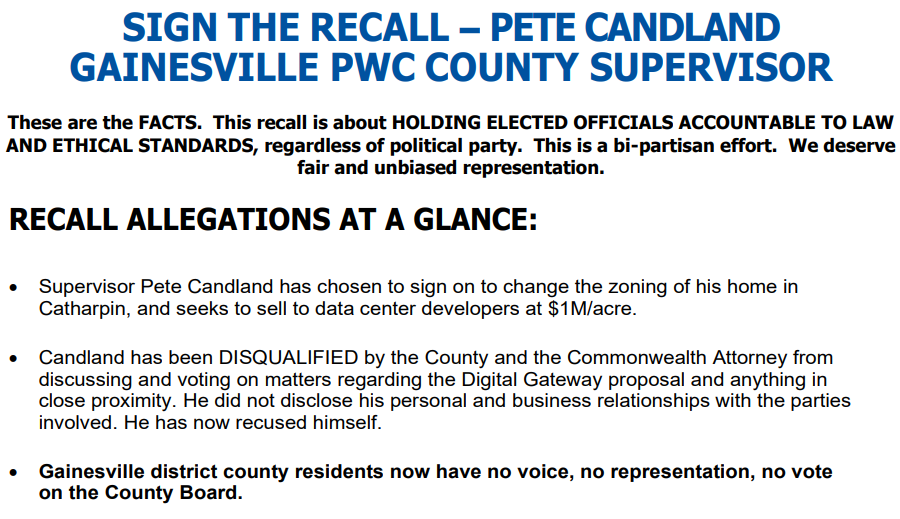
a Prince William County supervisor resigned in 2022 before recall petitions were filed with the Circuit Court
Source: Protect Prince William, Sign the Recall
One option available to local governments is to pass a resolution censuring officials whose conduct is judged to be inappropriate, but for which removal from office would be too extreme. The Lynchburg City Council censured one of its member, Martin Misjuns, on November 28, 2023 for threatening and inappropriately trying to issue directions to city staff who were supervised by the city manager, and for his failure to act with decorum and decency. His behavior towards city staff may have been affected by being fired, before voters elected him in 2022, from the fire department for posting a cartoon viewed as transphobic.
Misjuns portrayed himself as a disruptor elected to change policies, but advocated hard-right positions in a fashion that embarrassed many city residents. His confrontational approach failed to create four-vote coalitions on the seven-member council even though there five Republicans on it.
Censure did not affect his ability to vote on issues or speak at the dais, but did impose a fine docking him one month of salary. Since the annual salary for serving on the Lynchburg City Council was $10,000, the economic punishment amounted to $833.
Misjuns' term run through 2026. If he choses to run again, voters can choose whether he should be retained or replaced - unless City Council expelled him for "for malfeasance or misfeasance in office," or a recall campaign managed to get enough signatures to meet the city charter requirement. The charter set a high threshold: 10% of the number of voters registered on January 1 of the year of the petition, which would require gathering over 5,000 valid signatures from city residents.
Martin Misjuns asked the Lynchburg Circuit Court to rule that the censure violated state law. He claimed it was an illegal retaliation for expressing his views, but the court chose not to intervene.
Misjuns was censured a second time in 2024, along with fellow city council member Jeff Helgeson. They had violated attorney-client privilege by releasing an e-mail from the city attorney. They supported a lawsuit to overturn the results of a Republican primary election for another city council seat, and sought to discredit the city attorney's engagement in the lawsuit. The censure resolution stated:36
As authorized by the city charter, Helgeson was fined one month of city council pay. Because it was a second offense, Misjuns was fined two months of pay for serving on the council. Both were blocked from participating in the city council's annual performance review of the city attorney, and the attorney was authorized to ignore communications from the two censured members. Even the seating arrangements on the dais were revised, so Helgeson and Misjuns were placed at opposite ends and the furthest distance from the center.37
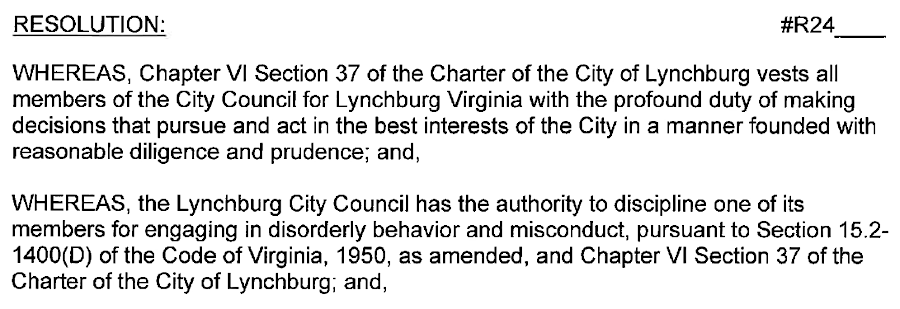
the charter for the City of Lynchburg authorizes censure of members of the city council
Source: Lynchburg City Council, Special Called Meeting (August 13, 2024)
One unusual punishment was imposed in Isle of Wight County. A candidate running for a Board of Supervisors seat won a 2023 election, perhaps in part because her son-in-law stole campaign signs of the write-in opponent. The winning candidate claimed that she found the signs in her son-in-law's truck. Instead of returning the stolen property, she placed them in a crawlspace at her home.
Because AirTags had been placed on some signs when first installed, a police officer for the Town of Smithfield found the signs. After the election, the candidate was charged with receiving stolen goods.
A General District Court judge agreed with the prosecutor that the candidate had shown dishonest intent. Instead of finding her guilty and imposing a sentence, however, the judge deferred the finding and gave her an opportunity to complete 250 hours of community service. After completion, he would dismiss the charges.
Because the crime was a misdemeanor (punishable by up to a year in jail and a fine of up to $2,500) and not a felony, even a criminal conviction would have allowed her to serve on the Board of Supervisors. The judge decided that public awareness of the theft within the community was part of the punishment, and that the soon-to-be-sworn-in supervisor:38
An official who resigns his or her office has until midnight to rescind their resignation. In Augusta County, the Board of Supervisors received an e-mail 18 minutes before a meeting that one member was resigning that day. The supervisors quickly called a closed session to discuss the impacts of the resignation. A lawsuit to obtain a recording of the closed session, which had been made secretly by a participant, required a judge to determine if the resigning supervisor was still an elected official or had become a private citizen at the time of the meeting.
The judge ruled that the supervisor was still in office until midnight of the day the resignation was submittted.39
When a vacancy occurs, a board can start the process to appoint a replacement as fast as local procedures permit. After an elected official announces a resignation date, a request for a writ of election can be submitted to the Circuit Court even before the seat is vacant.
In 2023, a member of the Board of Supervisors in New Kent County died soon after she had been elected in November to a new four-year term. The remaining members appointed a replacement to serve for the first year of that term, until a special election on November 5, 2024..
There was some local controversy because the Board of Supervisors did not wait to make the appointment until two newly-elected members would be on serving in January. When the new board took office, there was a proposal to call for a special election soon, rather than allow the new appointed to serve until November. There was also a motion for the new board to appoint the same person as the interim supervisor, but the county attorney advised that the replacement process was consistent with state law.
The Attorney General claimed the appointment violated state law, but his office missed a deadline for filing suit to vacate the seat and force a special election. Because the incumbent died before her new term began, the Attorney General claimed an interim appointment could not be made for the new term. His office wrote:40
The new board eventually duplicated the action taken in 2023 and went through the process to appoint the new supervisor. There was no court decision to determine if the action was legally required, but re-appointment by the new board ended the debate.41
A member of the Roanoke city council won the mayor's race in 2024. He vacated his position with slightly less than two years remaining in the term. According to the city charter, city council was responsible for appointing a replacement to complete the term. Had the time remaining been greater than two years, a special election would have been required.
There were 11 applicants for the position. The five remaining city council members and the new mayor decided they were unable to agree among the three finalists on a replacement within the 45 days allotted for action, so the five judges of the Roanoke Circuit Court had to make the appointment. It was apparently the first time in the city's history that the elected officials declined to make such a decision and instead have the local court that responsibility. The chief judge commented on the deadlock:42
Cardinal News noted that all vacant seats in the much larger Virginia House of Delegates and the US House of Representatives, where members are elected for two year terms, are filled by special elections. The vacancy in Roanoke was 1/7th of the voting members.
The appointed member was expected to serve the remainder of the two-year term. By one interpretation of the Code of Virginia, an appointee could serve only until a special election was held. The Roanoke Circuit Court and the General Assembly did not make that interpretation, however.
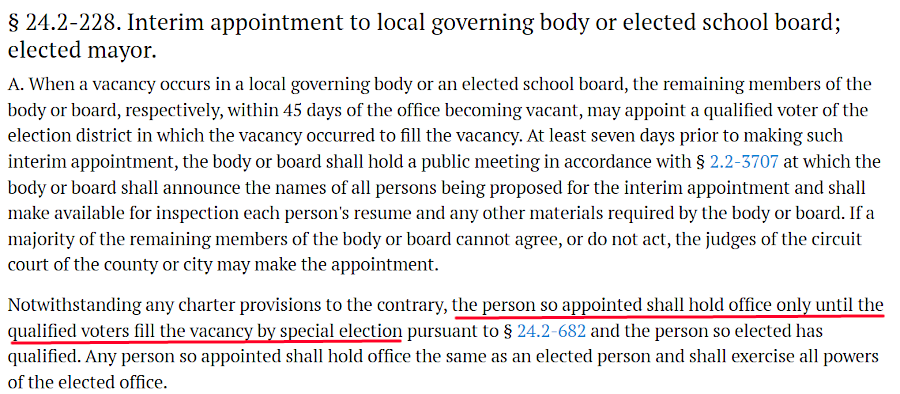
the Code of Virginia could be interpreted to require a special election after City Council makes a temporary appointment
Source: Code of Virginia, Section 24.2-228. Interim appointment to local governing body or elected school board; elected mayor
The newspaper analyzed the charters of the 38 cities in Virginia and how each provided for filling vacancies. It identified that the charters of Chesapeake, Hampton and Virginia Beach require members of their city councils to resign in order to run for mayor, ensuring that the voters will elect the replacement for the remainder of the term. Across the 38 charters:43
Before the court could act, the Roanoke City Council reversed course and finally appointed a replacement member. The council, in a 4-2 vote, appointed the candidate who had finished fourth in the race for three seats the previous November. She was one of the three finalists when council had deadlocked on the choice.44
In late November 2024, the Mineral Town Council tried to expel a member. He had been appointed to fill a vacancy in April and won election in early November, but the other members accused him of harassing and demeaning town staff. The council members held a closed meeting and, following Robert's Rules of Order, decided in a 5-0 vote to expel the member (who was not in attendance) from both the appointed and elected positions. The town attorney advised that the process was legal under the town charter; the town council had an alternative to following the Code of Virginia process.
The member rejected the legitimacy of the action and sat at the dais at a December meeting called to select his replacement. When he refused to leave, a deputy sheriff arrested him and placed him in handcuffs. The deputy was told the person was not a member of town council, and by his continued presence he was trespassing. The Commonwealth's Attorney for Louisa County declined to prosecute the charge of disorderly conduct.
After receiving additional legal advice, the town council rescinded its decision and the member regained his seat. The mayor of Mineral, who had been a key player in the failed expulsion, soon resigned and took a new job in Lousiana.45
In 2025, a member of the Blacksburg Town Council was convicted of election fraud. He listed a false address, claiming to live in the town, when filing paperwork for the 2023 election and then voting in it. He won as a write-in candidate for a seat in which no one qualified to be listed on the ballot in 2023. The candidate never slept at the address he listed, but claimed that he had been advised by the town mayor (who owned the property) that his intent was sufficient to qualify him to run.
The felony conviction did not automatically remove him from office. The town attorney noted that under state law, he could continue to serve until all appeals have been exhausted because state law superceded the provision in the town charter that required immediate forfeiture of the office. The convicted member of Town Council chose to resign.45